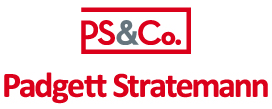
 By Kelli Falk, CPA, CIA, CISA, CITP
By Kelli Falk, CPA, CIA, CISA, CITP
Does your organization perform services for other companies or act as a user organization that outsources some of its processes to another company? In either case, you should be aware of the guidance related to service organizations.
 It has now been almost five years since the American Institute of Certified Public Accountants (AICPA) issued its updated guidance related to an entity’s use of service organizations – SSAE No. 16, Reporting on Controls at a Service Organization; AICPA, Professional Standards, Vol. 1, AT Section 801) and Attest Engagements AT Section 101, This change was due to the increase in outsourced processes that do not necessarily fall within the financial reporting category previously addressed by Statement on Auditing Standards (SAS) No. 70, Service Organizations, AU Section 324.
It has now been almost five years since the American Institute of Certified Public Accountants (AICPA) issued its updated guidance related to an entity’s use of service organizations – SSAE No. 16, Reporting on Controls at a Service Organization; AICPA, Professional Standards, Vol. 1, AT Section 801) and Attest Engagements AT Section 101, This change was due to the increase in outsourced processes that do not necessarily fall within the financial reporting category previously addressed by Statement on Auditing Standards (SAS) No. 70, Service Organizations, AU Section 324.
Since that time, there has been a dramatic increase in demand for Service Organization Controls (SOC) engagements. While you might not think of your company as a service or user organization, there are numerous situations, industries, and even types of companies that would benefit from this type of examination:
- Confidentiality over records retention for municipalities, marketing plans, etc.
- Cloud computing/Software as a Service (SaaS)
- Direct mail marketing
- Secure printing
- Data storage/data centers
- Managed services
- Medical claims processing
- Third-party administrator for employee benefit plans
- Welfare case management
- Gambling systems
- Secure payment processing/lockbox services
- Loan processing
- Title companies
- Hospice organizations
- Payroll processing
- Records management
The extent of these engagements can vary greatly; some might only consider confidentiality of customer data, while others cover all aspects of an application’s processing integrity. The scope is entirely up to the service organization and is based on the needs of its users.
The increase in these engagements is due to recent high-profile security breaches and the never-ending push for tighter security. Because of these, user organizations have become much more aware of their needs related to outsourcing their processes. They have learned – sometimes the hard way – that just because a process is outsourced, the associated risks are not.
This is where the SOC engagements enter the picture. They are designed to cover any controls over which users need assurance. It is also a great benefit for the service organizations themselves because they can be audited one time instead of continually answering questions from their customers’ auditors, or even incurring significant time and resources by being audited by each customer’s auditor. We have seen several instances in which a client needed a SOC report immediately because they could not obtain a lucrative contract without it. In some cases, clients use the report as a marketing tool to give their prospective customers assurance that their controls are functioning as stated. The uses of the reports are plentiful.
If you feel you or your service organization needs a SOC engagement over its controls, please feel free to contact Kelli Falk at kelli.falk@padgett-cpa.com or (210) 253-1669 for more information.

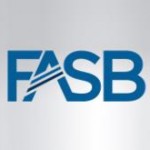 of revenue under U.S. GAAP and IFRS. The new standard provides a comprehensive revenue recognition standard that applies to a wide range of transactions and industries, including those that followed industry specific guidance, such as the construction, software, and real estate industries. The new standard should improve U.S. GAAP and IFRS by providing a framework to address revenue recognition issues, improving comparability of revenue recognition practices, simplifying the preparation of financial statements, and requiring enhanced disclosures.
of revenue under U.S. GAAP and IFRS. The new standard provides a comprehensive revenue recognition standard that applies to a wide range of transactions and industries, including those that followed industry specific guidance, such as the construction, software, and real estate industries. The new standard should improve U.S. GAAP and IFRS by providing a framework to address revenue recognition issues, improving comparability of revenue recognition practices, simplifying the preparation of financial statements, and requiring enhanced disclosures. UNITED SA Federal Credit Union is pleased to announce the appointment of Bill Gregory as chairperson of the board of directors. Mr. Gregory has been a certified public accountant in San Antonio for 29 years and is the managing member of the CPA firm of Gregory & Crutchfield, LLC. He also has experience in banking, real estate and the oil and gas industry.
UNITED SA Federal Credit Union is pleased to announce the appointment of Bill Gregory as chairperson of the board of directors. Mr. Gregory has been a certified public accountant in San Antonio for 29 years and is the managing member of the CPA firm of Gregory & Crutchfield, LLC. He also has experience in banking, real estate and the oil and gas industry. Serving on the board in 2014 with Mr. Gregory will be: Rick Tobias, vice chairperson; Don Mann, treasurer; Richard Baggs, secretary; Peter Hugdahl; Rosaura Ramirez; John Rees; and Arthur Settles.
Serving on the board in 2014 with Mr. Gregory will be: Rick Tobias, vice chairperson; Don Mann, treasurer; Richard Baggs, secretary; Peter Hugdahl; Rosaura Ramirez; John Rees; and Arthur Settles.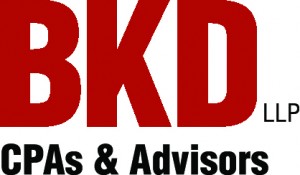 Jon McDowell, managing partner of BKD, LLP’s San Antonio office, announced BKD’s debut on Training magazine’s annual Training Top 125, which ranks companies based on the excellence of their training and development programs.
Jon McDowell, managing partner of BKD, LLP’s San Antonio office, announced BKD’s debut on Training magazine’s annual Training Top 125, which ranks companies based on the excellence of their training and development programs.

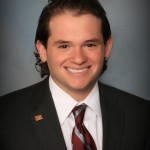 Before joining BKD, Negem spent a year and a half with Pannell Kerr & Forster of Texas, P.C as a Tax Associate. Negem is a graduate of Texas A&M University with a Bachelor of Business Administration in Accounting and a Master of Science in Accounting. In 2013, he received his CPA license in Texas.
Before joining BKD, Negem spent a year and a half with Pannell Kerr & Forster of Texas, P.C as a Tax Associate. Negem is a graduate of Texas A&M University with a Bachelor of Business Administration in Accounting and a Master of Science in Accounting. In 2013, he received his CPA license in Texas.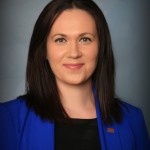 Before joining BKD, Wonser spent over three years with JSM Management, Inc., as an accountant. Wonser is a graduate of Illinois State University with a Bachelor of Science in Finance and a graduate of Upper Iowa University with a Bachelor of Science in Accounting. Wonser passed the CPA exam in Illinois and is awaiting licensure.
Before joining BKD, Wonser spent over three years with JSM Management, Inc., as an accountant. Wonser is a graduate of Illinois State University with a Bachelor of Science in Finance and a graduate of Upper Iowa University with a Bachelor of Science in Accounting. Wonser passed the CPA exam in Illinois and is awaiting licensure.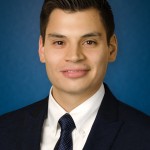 Before joining BKD, Romero spent over seven years with Carranco & Lawson, P.C., most recently as a tax accountant. Romero is a graduate of Texas A&M University – International University with a Bachelor of Business Administration in Accounting. David passed the CPA exam and is awaiting his Texas license.
Before joining BKD, Romero spent over seven years with Carranco & Lawson, P.C., most recently as a tax accountant. Romero is a graduate of Texas A&M University – International University with a Bachelor of Business Administration in Accounting. David passed the CPA exam and is awaiting his Texas license. Before joining BKD, Olivares spent over two years with Alamanza Business Group, LLC, as a tax accountant. Olivares is a 2011 graduate of The University of Texas at San Antonio with a Bachelors of Business Administration in Accounting.
Before joining BKD, Olivares spent over two years with Alamanza Business Group, LLC, as a tax accountant. Olivares is a 2011 graduate of The University of Texas at San Antonio with a Bachelors of Business Administration in Accounting. Thompson is a 2013 graduate of The University of Texas at San Antonio with a Master of Business Administration.
Thompson is a 2013 graduate of The University of Texas at San Antonio with a Master of Business Administration.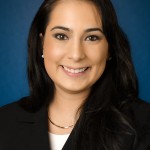 Strickland is a 2013 graduate of St. Mary’s University with a Master of Business Administration in Accounting and a 2010 graduate of St. Mary’s University School of Law with a Juris Doctor.
Strickland is a 2013 graduate of St. Mary’s University with a Master of Business Administration in Accounting and a 2010 graduate of St. Mary’s University School of Law with a Juris Doctor. Arredondo is a 2010 graduate of The University of Texas at San Antonio with a Bachelor of Business Administration in Accounting. She obtained a Master of Accountancy from The University of Texas at San Antonio in 2012. Arredondo previously worked with BKD San Antonio as an audit intern (2011 and 2012) and associate (2013).
Arredondo is a 2010 graduate of The University of Texas at San Antonio with a Bachelor of Business Administration in Accounting. She obtained a Master of Accountancy from The University of Texas at San Antonio in 2012. Arredondo previously worked with BKD San Antonio as an audit intern (2011 and 2012) and associate (2013).
 The Austin office of Padgett Stratemann & Co. for the second year in a row has been voted one of the city’s best Texas-based business accounting providers by the readers of Texas Lawyer, a weekly industry newspaper and online news source for the Texas legal community.
The Austin office of Padgett Stratemann & Co. for the second year in a row has been voted one of the city’s best Texas-based business accounting providers by the readers of Texas Lawyer, a weekly industry newspaper and online news source for the Texas legal community.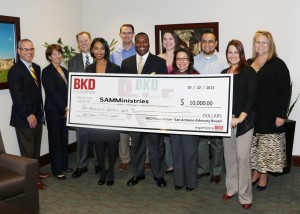 Matheson had this to say, “Each year we ask our employees to nominate a charity they believe should be the recipient of our $10,000 award and to provide the committee with an example of how the charity helps and how they exhibit our PRIDE values. Our PRIDE values encompass Passion, Respect, Integrity, Discipline and Excellence.” After the nominees were identified, each charity’s representative visited with BKD personnel so that they could learn firsthand about each organization’s mission. Afterwards, the employees voted and SAMMinistries was selected based on the nomination which identified SAMMinistries passion that each person it serves has the power to transform their lives and live independently. They show respect for others by treating each person with dignity and giving them equal opportunity to succeed. SAMMinistries maintains integrity by striving to be true to its values in both word and deed. They are disciplined in their approach to fundraising and in their approach with clients whose lives they are helping to re-build. SAMMinistries believes that a ministry to people in need demands their very best. In striving for excellence, SAMMinistries honors the trust that donors place in them and they give their best to clients every day.
Matheson had this to say, “Each year we ask our employees to nominate a charity they believe should be the recipient of our $10,000 award and to provide the committee with an example of how the charity helps and how they exhibit our PRIDE values. Our PRIDE values encompass Passion, Respect, Integrity, Discipline and Excellence.” After the nominees were identified, each charity’s representative visited with BKD personnel so that they could learn firsthand about each organization’s mission. Afterwards, the employees voted and SAMMinistries was selected based on the nomination which identified SAMMinistries passion that each person it serves has the power to transform their lives and live independently. They show respect for others by treating each person with dignity and giving them equal opportunity to succeed. SAMMinistries maintains integrity by striving to be true to its values in both word and deed. They are disciplined in their approach to fundraising and in their approach with clients whose lives they are helping to re-build. SAMMinistries believes that a ministry to people in need demands their very best. In striving for excellence, SAMMinistries honors the trust that donors place in them and they give their best to clients every day.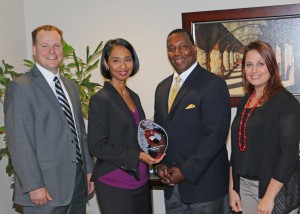 Williams accepted a custom-made glass art work (Glen Andrews Studio: Caliente Hot Glass) award and a check for $10,000. Williams stated that, “We are honored to be chosen by BKD, and grateful for their contribution to SAMMinistries. As a Ministry, we strive to work with integrity as we help San Antonio families overcome homelessness. I am proud to lead a team that is recognized by fellow community members for this work.”
Williams accepted a custom-made glass art work (Glen Andrews Studio: Caliente Hot Glass) award and a check for $10,000. Williams stated that, “We are honored to be chosen by BKD, and grateful for their contribution to SAMMinistries. As a Ministry, we strive to work with integrity as we help San Antonio families overcome homelessness. I am proud to lead a team that is recognized by fellow community members for this work.”